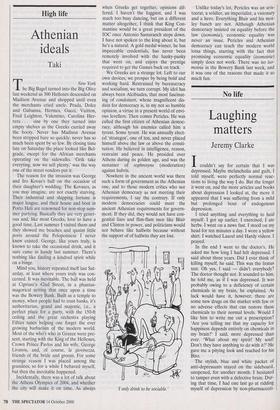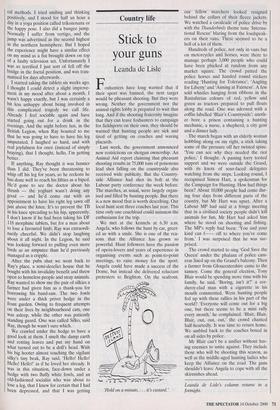No life
Laughing matters
Jeremy Clarke
Icouldn't say for certain that I was depressed. Maybe melancholia and guilt, I told myself, were perfectly normal reac- tions to living the way I do. But the longer it went on, and the more articles and books about depression I looked at, the more it appeared that I was suffering from a mild but prolonged bout of endogenous depression.
I tried anything and everything to heal myself. I got up earlier, I exercised, I ate herbs. I went on a news fast. I stood on my head for ten minutes a day. I wore a yellow shirt. I watched Laurel and Hardy videos. I prayed.
In the end I went to the doctor's. He asked me how long I had felt depressed. I said about three years. Did I ever think of killing myself, he said. This was the litmus test. Oh yes, I said — didn't everybody? The doctor thought not. It sounded to him, he told me, as if I was depressed. It was probably owing to a deficiency of certain chemicals in my brain, he explained. As luck would have it, however, there are some new drugs on the market with few or no adverse effects that can restore these chemicals to their normal levels. Would I like him to write me out a prescription? `Are you telling me that my capacity for happiness depends entirely on chemicals in my brain?' I said, more depressed than ever. 'What about my spirit! My soul! Don't they have anything to do with it?' He gave me a pitying look and reached for his Biro.
The stylish, blue and white packet of anti-depressants stayed on the sideboard, unopened, for another month. I hesitated to tamper even with a defective brain. Dur- ing that time, I had one last go at ridding myself of depression by non-pharmaceuti- cal methods. I tried smiling and thinking positively, and I stood for half an hour a day in a yoga position called trikonosana or the happy pose. I also did a bungee jump. Normally I suffer from vertigo, and the Jump was advertised as the second highest in the northern hemisphere. But I hoped the experience might have a similar effect on my mind as a fist brought down on top of a faulty television set. Unfortunately I was so terrified I just sort of fell off the bridge in the foetal position, and was trau- matised for days afterwards.
I started taking the tablets six weeks ago. I thought I could detect a slight improve- ment in my mood after about a month, I wasn't happy exactly, but I was certainly a bit less unhappy about being involved in this complicated tragedy we call life. Already I feel sociable again and have started going out for a drink in the evenings. And the night before last, in the British Legion, when Ray boasted to me that he was going to have to have his leg amputated, I laughed so hard, and with real joyfulness for once (instead of simply braying), that I thought, hello, I'm getting better.
If anything, Ray thought it was funnier than I did. They've been threatening to whip off his leg for years, so he reckons he has done well to reach his fifties as a biped. He'd gone to see the doctor about his thrush — the yoghurt wasn't doing any good — and he'd come out with an appointment to have his right leg sawn off just above the knee. It's to prevent the TB in his knee spreading to his hip, apparently. I don't know if he had been taking his DF 118 morphine tablets, but for a man about to lose a favoured limb, Ray was extraordi- narily cheerful. We didn't stop laughing about it all night. In the Legion, he said was looking forward to pulling even more birds as an amputee than he'd previously managed as a cripple.
After the pubs shut we went back to Ray's place, a semi-derelict house that he bought with his invalidity benefit and threw open to homeless people and stray animals. Ray wanted to show me the pair of silkies a farmer had given him as a thank-you for borrowing his band-saw. The two fowls were under a thick privet hedge in the front garden. Owing to frequent attempts on their lives by neighbourhood cats, one was asleep, while the other was patiently standing guard. One was called Silko, said Ray, though he wasn't sure which.
We crawled under the hedge to have a good look at them. I smelt the damp earth and rotting leaves and put my hand on what turned out to be a doll's head. With his big hooter almost touching the vigilant silky's tiny beak, Ray said, 'Hello! Hello! Hello! Hello!' as if he loved her already. It was in this situation, face-down under a hedge with two fluffy white fowls, and an old-fashioned socialist who was about to lose a leg, that I knew for certain that I had been depressed, and that I was getting



















































































 Previous page
Previous page